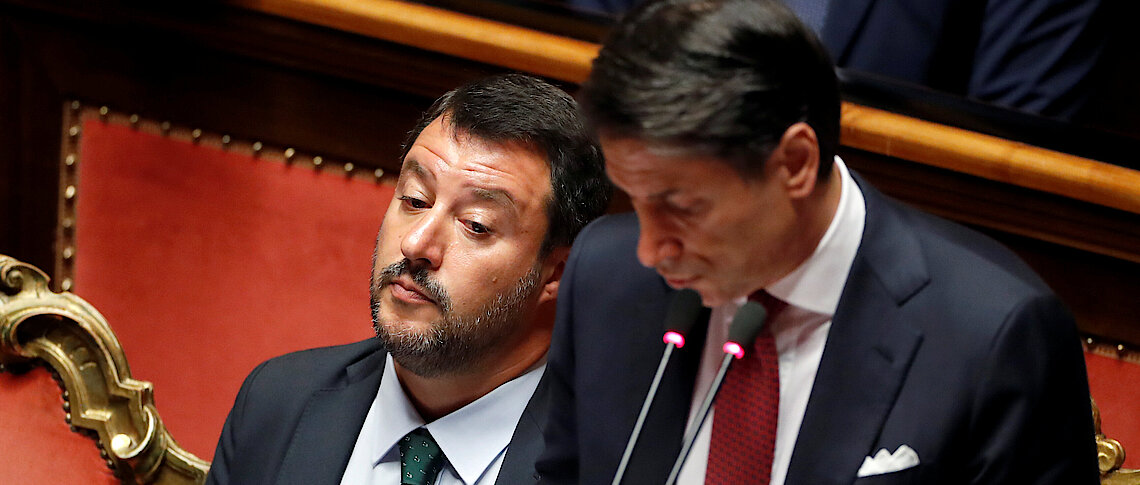Read this article in German.
The drama that has unfolded on the Italian political stage for almost two weeks now is rich in surprising twists and turns. Even in Italy, one has not yet been offered such a staging – though there had been a lot to see here in the past. In the current drama, the curtain has not yet fallen and the outcome remains open. Some actors have stepped off-stage in the meantime, some don't want to leave or try to change their role, others are striving back into the limelight and some hope for their first big performance.
With his call for new elections, Italy's Interior Minister Matteo Salvini had plunged the Italian government into a serious crisis. His intention was to turn the Lega’s high polling into seats in parliament. As a formal junior partner in the government, the Lega achieved 17.3 per cent of the votes in the 2018 parliamentary elections, while the Five Star Movement received 32.7 per cent.
Over the past year and a half, Salvini has managed to boost his own popularity and, thereby, that of his party. In the European Parliament elections in May 2019, the Lega reached 34.3 per cent, while the Five Stars fell to 17.1 per cent. Some polls saw Salvini close to the 40 per cent mark at the end of June. Because of the specifics of Italian electoral law, this would be enough for the absolute majority. The tactician and power politician Salvini did not want this opportunity to pass. In the middle of summer, when almost all of Italy is on holiday, he invented a crisis of confidence in the government, with the aim of holding new elections soon.
The return of Grillo and Renzi
But – so it seems at present – that was a massive miscalculation. First of all, the otherwise colourless Prime Minister Conte did not want to resign just like that. The Senate also rejected an immediate session and adjourned to the following week. A coalition of the Five Star Movement and the social democratic Partito Democratico (PD), who until then had been bitterly hostile to each other, inflicted this defeat on Salvini. Two veterans entered the ring and stirred up Italy’s political landscape.
Beppo Grillo, the founding father of the Five Star Movement, who had already retired from the political circus and confined himself again to his core competence as a clown, called for a battle against the Lega’s new barbarians. And Matteo Renzi, a former PD shooting star who suddenly crashed in the 2018 elections and got lost in political meaninglessness, called for his party to form a coalition with the Five Stars. The same Matteo Renzi who, of all people, was their strongest opponent to date.
But the bond between the Five Stars and Lega is definitely severed – for now at least.
This turn of events brought PD leader Nicola Zingaretti into a corner. It was only in March that he was elected party chairman. He had set himself the goal of uniting the notoriously divided party, moving to the left and opening it up more to the socio-political environment. Zingaretti is a party leader without a significant following in parliament, the current PD deputies were appointed by Renzi. New elections would enable Zingaretti to place his own confidants in the Senate and Chamber, thus severely curtailing Renzi's influence. Against this background, it’s not surprising that he tends to favour new elections, while Renzi rejects them.
Salvini’s miscalculation
Salvini, on the other hand, had to watch things develop in an unfavourable direction. Suddenly, he signalled his willingness to talk again. His telephone is always on, he announced. But the Five Stars didn’t call.
Then, on August 20th, the showdown took place. The members of the government of the Five Stars had come early to the Senate plenary hall and occupied all the chairs on the government bench in order to leave no room for the colleagues of the Lega. Salvini, after all Deputy Prime Minister, had to fight for a chair at the head of government's side. Then Conte appeared and declared the end of the government and announced his resignation.
In a speech lasting almost an hour, he first listed the successes of his government actions, and then, despite all his friendliness in tone and appearance, dragged his Interior Minister over the coals: Salvini was irresponsible, a pity for Italy and put his personal and party interests above those of Italy. He had harmed the government's reputation, disregarded the institutional rules and procedures of parliamentary democracy, invaded other ministries and misused religious symbols for political purposes. Salvini, who was disciplined like a schoolboy, defiantly kissed his rosary.
For the time being, it’s unclear what will happen to Salvini who has miscalculated with the staging of this summer crisis.
Conte displayed his calibre, for the first time he was really head of government, albeit only for one day. After the four-hour debate, he drove to the Italian President and offered his resignation. The president accepted and asked Conte to continue the government's business provisionally. The one who has still not resigned is Interior Minister Salvini who never tires of accusing everyone else of sticking to their chairs. At the last minute, he had the no-confidence motion against Conte withdrawn again, hoping that a rapprochement would be possible. But the bond between the Five Stars and Lega is definitely severed – for now at least.
New elections or new government coalition?
Now President Matterella has taken over the direction. In the coming days, he will hold consultations with the representatives of the parties and the chairmen of the Senate and Chamber. He has signalled that he does not want a long hanging game or any transitional solutions. A technocratic government of experts, which only holds office for a few months, gets the budget through parliament and pushes through some reforms, thus seems to be off the table.
So only two options remain: a new election, which would probably be held at the end of October or the beginning of November, or a new permanent government majority between the Five Star Movement and Partito Democratico. Whether this can really succeed is still unclear at the moment. But at least the two parties are willing to approach each other and see whether there’s a basis for stable cooperation. The joint intention to prevent new elections and keep Salvini away from the government, however, is probably not enough for a coalition between two parties, which until recently exchanged the most vehement accusations.
The Partito Democratico has outlined its conditions for a coalition with the Five Stars. The new government would have to show high discontinuity both in terms of content and personnel. Zingaretti cited the following points as the PD’s central programmatic concerns: Italy's membership of the EU, full recognition of representative democracy and the central position of parliament, an ecologically sustainable development strategy for Italy, a change in migration policy and a new orientation in financial and social policy. In the next few days, Zingaretti and the Chairman of the Five Stars di Maio will have to agree on these points and on a personnel tableau.
The President will not give them much time. It doesn’t seem unlikely that an agreement can be reached between the two chairmen, but both share one concern: how reliable is Matteo Renzi? Will Renzi really support this new government in the long term or will he soon overthrow it to form a centrist party with his followers and campaign with it in the spring of 2020? If this were to happen, the absurd political theatre in Italy would have reached another stage. It’s hardly surprising that Italian citizens are increasingly turning their backs on politics and less and less trusting it to look after the common good.
For the time being, it’s unclear what will happen to Salvini who has miscalculated with the staging of this summer crisis. Even though his party is beginning to criticise him a little bit, he’s still the undisputed leader of the Lega. But he wouldn't be the first politician to fly very high in Italy and then crash abruptly. That would be good news for Italy and Europe. But the end of the absurd theatre is unclear – it could also develop into a tragedy.






